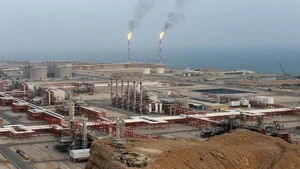The move by the world's top oil producers is controversial, as production cuts help stabilise the energy market, but could also contribute to the "hot" inflation situation again.
Saudi Arabia and Russia have taken the lead in the announced cuts, with each set to reduce their output by 500,000 barrels per day until the end of 2023.
Many other members also simultaneously announced voluntary cuts starting from May and lasting until the end of 2023: Iraq will cut 211,000 bpd; United Arab Emirates (UAE) will cut 144,000 bpd; Kuwait announced a cut of 128,000 bpd; Oman announced a cut of 40,000 bpd; Algeria said it would cut its output by 48,000 bpd; and Kazakhstan will also cut output by 78,000 bpd.
The pledges bring the total volume of cuts by OPEC+, which groups the Organization of the Petroleum Exporting Countries with Russia and other allies, to 3.66 million bpd according to Reuters calculations, equal to 3.7% of global demand.
The decision of the series of OPEC + countries to cut output at this time was completely unexpected as it was made exactly a day before a virtual meeting of an OPEC+ ministerial panel.
Analysts had predicted, the virtual meeting on April 3 had been expected to stick to 2 million bpd of cuts already in place until the end of 2023.
Saudi Arabia's Ministry of Energy said that this voluntary reduction was a precautionary measure aimed at supporting the stability of the oil market.
Some experts also say that OPEC + is acting on a precautionary basis to prevent the repeat of the bad scenario that happened in 2008, when the world's top oil exporters cut production too late and did not in time to prevent oil prices from plunging due to the pressure of the global financial crisis at that time.
Last month, oil prices fell to a 15-month low amid turmoil in financial markets with the collapse of several major banks in the U.S. as well as Credit Suisse's second-largest bank bailout.
"OPEC is taking pre-emptive steps in case of any possible demand reduction," said Amrita Sen, the founder and director of Energy Aspects.
Goldman estimated the output reduction could provide a 7% boost to oil prices, contributing to higher Saudi and OPEC+ oil revenue.
OPEC + was criticized for the move, with experts saying that the market had "failed to return". Reacting quite harshly, the U.S. said that the move announced by the OPEC + producers as unwise.
"We don't think cuts are advisable at this moment given market uncertainty - and we've made that clear," a spokesperson for the National Security Council said.
A sharp increase in crude oil prices could push inflation further up, given the high rate of price growth in many major economies. This will complicate the task of controlling inflation for central banks, including the U.S. Federal Reserve (FED), which has raised interest rates nine times in the past year.
The energy market will continue to be unpredictable as the world's top producers make unexpected moves.
Last year, U.S. President Joe Biden (G.Bai-sing) ordered the release of U.S. strategic oil reserves to "cool down" gasoline prices, in the context that fuel prices had skyrocketed after the conflict in Ukraine broke out.
To make up for the global oil shortage, some major producers such as Brazil, Canada, Guyana, Norway, and the U.S. are all increasing production.
According to economic analysts, the unexpected move to cut production was made by the key members of OPEC +, with the goal of supporting oil prices. The possibility of oil prices returning to the threshold of 100 USD per barrel is therefore increasing.
















